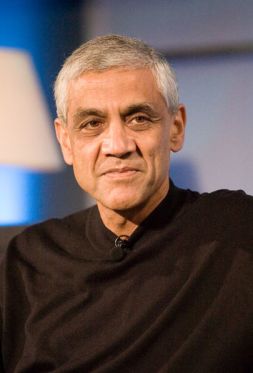 “I’m not skeptical that the Smart Grid should exist,” famed Silicon Valley investor Vinod Khosla said, kicking off his conversation with VentureBeat editor Matt Marshall at VentureBeat’s GreenBeat 09 event today. “I wouldn’t be here if I was.” Khosla has been unofficially dubbed a Smart Grid skeptic because his venture firm, Khosla Ventures, has yet to make a significant investment in the space. He says he has been avidly scouting for a Smart Grid startup to get behind — he just hasn’t found one yet.
“I’m not skeptical that the Smart Grid should exist,” famed Silicon Valley investor Vinod Khosla said, kicking off his conversation with VentureBeat editor Matt Marshall at VentureBeat’s GreenBeat 09 event today. “I wouldn’t be here if I was.” Khosla has been unofficially dubbed a Smart Grid skeptic because his venture firm, Khosla Ventures, has yet to make a significant investment in the space. He says he has been avidly scouting for a Smart Grid startup to get behind — he just hasn’t found one yet.
The key takeaway from Khosla’s short talk: Storage is the missing foundation that will make the Smart Grid a reality, and a more compelling opportunity for venture capitalists. He says he would be very interested in backing a storage solution that could make intermittent sources of energy like solar and wind better feeders for the grid — one that would also demonstrably lower costs for both consumers and utilities. As is, he says, the Smart Grid is sitting on a house of cards — it has no chance of encouraging conservation or cutting carbon emissions if it can’t properly store and use alternative energy in an economic way.
He says he is sure that there are Smart Grid winners in the works — the future Facebooks, Googles and Twitters of cleantech, but he doesn’t think any have emerged yet. One of the biggest hurdles to this development: closed networks and standards. In order for there to be productive experimentation on the edge of the industry, technologies have to be interoperable, open and collaborative. If this can happen, and the right technologies get the support they need, then there will be 95 losers for every 5 winners, but people will still make money.
Before this can take place though, Smart Grid companies also need to accept that consumer behavior is incredibly difficult to change, Khosla said. While 5 percent of the population will take the time to check in on their energy use and make an effort to conserve, another 80 percent will ignore it entirely. “When you ask how many people will worry about interest rates on their credit cards, the answer is not many — they don’t know what they are paying,” he said. “The one thing that does change behavior is dramatic changes in pricing — going from $2 to $4 for a gallon of gas — that creates change.”
AI Weekly
The must-read newsletter for AI and Big Data industry written by Khari Johnson, Kyle Wiggers, and Seth Colaner.
Included with VentureBeat Insider and VentureBeat VIP memberships.
Khosla said that analysts touting Smart Grid as a way to fight pollution are wrong. He went as far as to say that coal could be cleaned up to be even more carbon neutral than solar and wind sources. With carbon capture and other technologies — including one that can funnel greenhouse gases into producing green cement — coal, which will remain the most popular source of energy regardless of policy or technology, could be a route to prevent global warming.
Right now, investors and companies operating in the Smart Grid space seem to be biased against coal, charging full force toward green sources. He stressed that clean coal companies should get a piece of the Smart Grid pie in order to really make it a decarbonizing development.
“Be careful about the hype,” he said. “Always look at the economic proposition.”
VentureBeat's mission is to be a digital town square for technical decision-makers to gain knowledge about transformative enterprise technology and transact. Learn More